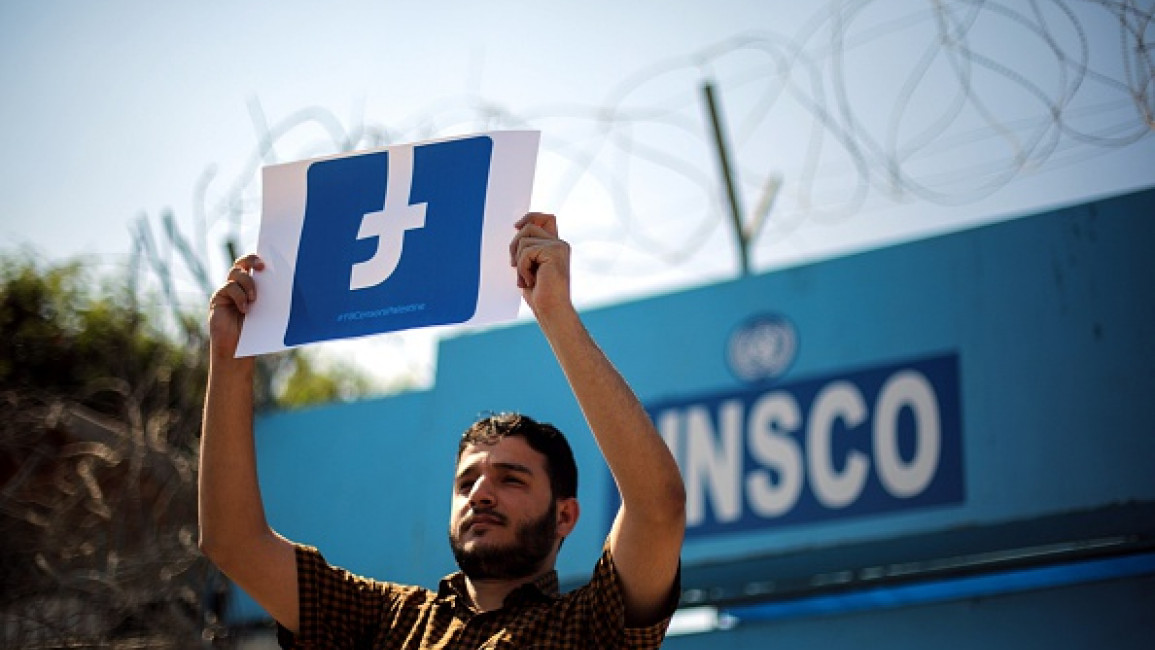
Beyond shadowbanning: Facebook posts can't liberate Palestine
Social media platforms controlled by Big Tech led by the likes of Meta, owner of Facebook are back to their old game of censoring activism for causes that do not align with their commercial interests or go against the 'red lines' of the dominant political class. No where else we see this more strongly than on the question of Palestine, and now the war on Gaza.
Last month, Human Rights Watch released a 51-page report which revealed that Meta has systematically censored voices of Palestinian solidarity, since hostilities between Israeli forces and Palestinian armed groups escalated on 7th October 2023. Between October and November, Human Rights Watch found 1050 cases of censorship, whether suspending or banning accounts, removing content or restricting users’ ability to interact with others’ posts, and shadow banning. Of all the cases censored, only 1 was in support of Israel.
In 2022, an external audit commissioned by Meta found the company’s policies “had an adverse human rights impact … on the rights of Palestinian users to freedom of expression, freedom of assembly, political participation, and non-discrimination, and therefore on the ability of Palestinians to share information and insights about their experiences as they occurred.”
🟡 FOLLOW US ON OUR BACKUP PAGE: https://t.co/wo0BftxUh1
— red. (@redstreamnet) January 2, 2024
Instagram suspended our account in a blatant attempt to censor our reporting on occupied Palestine. Other than stating that "community guidelines were not followed," Meta terminated our page without notice.
Our coverage… pic.twitter.com/eEAVUDrcQD
Internal policies at Meta are also fuelling algorithmic bias which discriminates against Palestinians. Similar to the Met Polices’ racist Gangs Matrix database, Meta’s Dangerous Organizations and Individuals policy, a secret blacklist of banned organisations and people, is disproportionately made up of Muslim, Middle Eastern, and South Asian people and organisations. Muslim people of colour are overpoliced online, a factor that has contributed to the over-enforcement and shadowbanning of Palestinians, a historically marginalised population who depend on digital networks to share their stories and lived experiences.
For many who have used Instagram or Facebook recently to post in solidarity with Palestine, this might come as no surprise. Posts relating to Palestine appear to have their views restricted, while links to donation pages and calls for ending investment in Israeli arms mysteriously crash users' apps.
Activists and journalists are again concerned they’ve been shadow-banned for posting in solidarity with Palestine. Journalist Motaz Azaiza, who has quickly become a force for change, battling the widespread erasure of the human rights violations in Gaza, said he often is unable to see stories he has shared. Content creator @seanramiz found that his TikTok video interviewing people attending the London demonstration in solidarity with Palestine was age-restricted shortly after it started trending.
There is a long history of censorship of Palestinian voices online, and it isn’t just a bug in the system but a feature of the wider context of a digital world dominated by interests that are hostile to cries of conscience.
Bias in favour of Israel: Feature, not a bug
Using social media for activism and organising has become second nature to the Gen-Z generation of young people and older age groups. From the Arab Spring to the Black Lives Matter, timelines have become pivotal spaces for accessing and sharing news, political education, and forming coalitions.
But it is naive to believe what we see on our feeds is curated to pander to our interests and views. Our platforms have the power to determine our ability to know or believe the truth or fall victim to political bias and misinformation, especially in times of political unrest and social injustice. They determine whose voice is amplified and who gets silenced.
It is worth remembering too that our platforms are not apolitical, even if they were not designed with civic participation in mind.
A lot has been written about the addiction-based business model of social media, about the monopolies of Silicon Valley and its unethical practices. But less has been said about the deeply vested interests between Big Tech and Israeli apartheid. No doubt, this plays a role in their censorship practices.
In May 2021, Amazon Web Services and Google Cloud executives signed a $1.22 billion contract to provide cloud technology to the Israeli government and military, known as Project Nimbus. No Tech for Apartheid is a movement of Google and Amazon workers who are calling for an end to this contract. In December, employees were sent home early from Google’s San Francisco HQ as 1000 workers and community members shut down the street at a die-in, in solidarity with people in Palestine.
Similarly, US tech giant Palantir provides intelligence data and surveillance services to Israel, which makes possible the digital infrastructure of the Israeli occupation of Palestine. This month, protestors gathered outside of Palantir’s UK HQ to protest their alleged complicity in the occupation.
In other words, Silicon Valley upholds the interests of those whom it profits most from and is unlikely to act against those interests.
Is Facebook reformbale?
Political leaders in the United States, the European Union, and elsewhere have been alerted to the nefarious power of social media platforms since the contested 2016 elections. Hearings were held following the Cambridge Analytica scandal and attempts are making their way through legislative chambers and courthouses to regulate them.
However, concerning the bias in favour of Israel, there is less appetite to intervene. One politician who bucked the trend recently was Senator Elizabeth Warren. Though no friend of Palestine, she recently sent a letter asking Facebook and Instagram for more transparency on the details of its content moderation related to Israel's war in Gaza, expressing concerns over discrimination, exacerbated violence, and the failure to address hate speech.
"Reports of Meta's suppression of Palestinian voices raise serious questions about Meta's content moderation practices and anti-discrimination protections," the senator wrote. "Social media users deserve to know when and why their accounts and posts are restricted, particularly on the largest platforms where vital information-sharing occurs."
However, it is extremely unlikely such solitary moves, which are closer to being grandstanding than real action, could initiate the kind of hearings we have seen against TikTok recently, given the overwhelming support for Israel from Western governments. While politicians and campaigners must go further in combating censorship if we are to have a digital world that supports our democratic and political participation, the slow-burn nature of democratic processes is at odds with our ever-evolving digital world and presents obstacles for us if we are to continue using social media as a primary means of activism.
Instead, it is more likely that Meta’s platforms and others cannot be trusted to protect free speech, especially about Palestine. This makes our methods of resistance all the more important.
Algorithmic mediation
For pro-Palestine activists and journalists, it may be useful to adopt tactics to get around the algorithms.
‘Face for the algorithm’ (when a user posts a selfie first to boost their post) or commenting on things unrelated to the posts such as “What did you get for Christmas?” have become tools in many a digital arsenal. @Hareth_Palestine shared a guide on how to bypass Instagram’s sensitivity settings, sharing that “sensitive means decolonization.” One may argue here that we shouldn’t have to develop tactics for subverting algorithmic suppression on social media because the platforms should serve us.
Yet if they are unreformable, it may also be useful to engage in smart, interlinked, and distributed posting on other platforms like Signal and Telegram (the list is endless) which offer alternatives that do not depend on the surveillance-based business model of Instagram and Facebook.
Ultimately, the suppression of Palestinian voices and solidarity is a reminder that instead of depending on specific platforms, we must recognize them as tools with flaws, due to the nature of who has created them and the profiteering purpose they serve. Organising creatively, and staying one step ahead of the censors, online and offline is vital for Palestinian liberation.
Adele Zeynep Walton is a British Turkish journalist, specialising in global inequality, politics and digital culture. She has written for The Independent, the i, Dazed, i-D, VICE, Metro, The Big Issue, Jacobin, Open Democracy, Tribune, Huck, gal-dem and more. She studied International Development at the University of Sussex.
Follow her on X @adelewalton121
Have questions or comments? Email us at: editorial-english@newarab.com
Opinions expressed in this article remain those of the author and do not necessarily represent those of The New Arab, its editorial board or staff.



